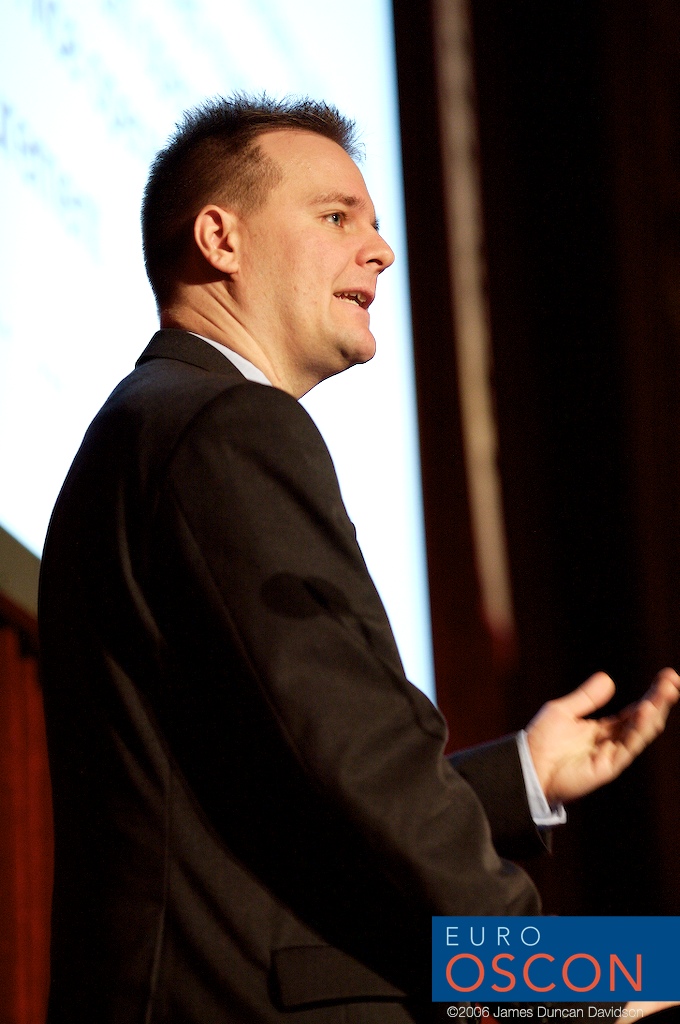Open Source Conference: Commercial Open Source conference
The first edition of the Festival of Innovation, held in Rome from the 7th of June to the 10th, yesterday guested the Commercial Open Source Software conference.
I introduced Bruce Perens saying that the expression Commercial Open Source is far from being an oxymoron, considering that commercial means either something oriented toward profit or pertaining to public trade or dealings.
Bruce was scheduled to deliver the opening keynote speech, and despite he was almost voiceless because of many previous events, he brilliantly managed to introduce the audience to Commercial Open Source. He started giving some background information on his life and works, and then invited people to consider the economic Function of software. As a matter of fact only 30% of US programmers are working by software companies, so most of the companies involved with software development are not in the business of software manufacturing. In other words Enabling technology, in other words, in his opinion it is not the profit-center, but a cost-center.
There are two main forms of enabling, cost-center technology: differentiating, and non-differentiating. Differentiating technology is what makes your business more desirable to your customer than your competitor’s business. [..] So, for Amazon, the “recommendation” software is a business differentiator. Obviously, it would be a mistake to Open Source your business differentiators, because then your competitor’s business might use them to become as desirable to the customer as your own business. [..] Perhaps 90% of the software in any business is non-differentiating. Much of it is referred to as infrastructure, the base upon which differentiating technology is built.
On friday afternoon Bruce raised up the same topic by FIDAInform, the National Federation of the Associations of Information Management Professionals, where he had an argument with a member, a Microsoft employee. Their discussion, while not lacking of mutual criticism, was of great interest to the audience, and Bruce eventually reported the differences existing between the two different business models also on Saturday.
Generally the initial development is done by a single entity as in the in-house and contract development paradigm, and the software is released to the public as soon as it is useful to others, generally before it would be considered a finished product and thus much earlier than a retail product would be released. [..]
The cost and risk of developing the product is distributed among these developers, and any combination of them can carry on the project if others leave. Distribution of cost and risk begins as soon as the project is mature enough to build a community outside of its initial developer.
On a different line Gabriele Ruffatti, Engineering’s legal representative in the ObjectWeb Consortium and a member of the SpagoBI & Spago projects board, gave a speech describing a different approach. Engineering is a large Italian IT firm employing about 3700 people – consider that only 0.4% of Italian IT firms employ more than 500 people and about 97% employ less than 10 people – and the System Integration represents more than 50% of their business.
In his opinion a commercial open source product is:
a solution claiming to be open source, claiming to have a community supporting it, but offering closed add-ons for enterprise adoption with a proprietary approach to the market.
He also added that Engineering have chosen the LGPL license, somehow implying that double-licensing doesn’t make much business sense to them. Bruce, that was totally voiceless at that stage, was disagreeing writing comments on his laptop, since he believes that double-licensing makes sense.
On behalf of the Italian Consortium of FLOSS firms, Carlo Daffara spoke about the importance of Open Source Selection, bringing the experience of well known European project like COSPA – the Consortium for Open Source Software in the Public Administration – and OpenTTT.
Emanuela Giannetta – Sun Microsytem Italia – started her speech mentioning OpenSolaris and Java, to eventually tell the audience about two Italian initiatives. JOB, an Italian portal created by her boss Franco Roman, and JikiBloom, a platform sponsored by Sun Microsystems Italia integrating a number of opensource projects, like Asterisk, Hylafax, Jboss, Pentaho, SugarCRM, Zimbra and others.
Pierpaolo Boccadamo – Microsoft Italia – gave a speech talking about the importance of Intellectual Property in the digital age – and he got few questions from the public in this respect – and eventually told that Microsoft is going soon to open its second Port25 Lab – the Microsoft Open Source Software Lab – somewhere in Italy.
Last but not least Bruce spent few words talking about Software Patents and Open Standards.
People from the public posed some questions to the panelists, ranging from Interoperability to patents, and among them Davide Gorini, Director of the first Italian Open Source Incubator, based in Rome, asked Bruce about Open Source Government policies. Bruce stated that in his opinion the law shouldn’t oblige to use open source software, but it has to be mandatory its evaluation. As he clearly explained, Public Administrations should make their choices considering technical merits and also valuating the impact of Open Source paradigm itself.
Many Thanks to LAit – Lazio Technological Innovation – for the perfect organization and for the gorgeous location chosen for the event!


 Changes.. by
Changes.. by  Truth or Consequences by
Truth or Consequences by  Florian Mueller by
Florian Mueller by  Eiffel tower by
Eiffel tower by
gabriele 9:07 pm on June 12, 2007 Permalink
To be as much clear as possible:
1) in the OSS domain a lot of commercial solution claiming to be …, claiming to have … exist (it’s not the definition of commercial OSS)
2) Engineering has chosen the LGPL license just for the SpagoWorld (www.spagoworld.org) initiative, not in general.
3) double licensing doesn’t make sense to SpagoWorld. It could makes sense in other business models, but in many situations it’s just a little differentiator from proprietary model
Roberto Galoppini 1:24 am on June 13, 2007 Permalink
Gabriele I am glad you didn’t mention to bring a new definition of what commercial open source is, but that’s also what I read. If this is not the case, you better ask them to change it.
Spago, SpagoBI and also Spago4q are all distributed under LGPL, and you also mention that LGPL was chosen in order to let it accepted by a consortium, am I right? Could you tell us more about it?
I don’t know what business model suites SpagoWorld, but it can’t be true that double-licensing be often meaningless. If this was the case OS firms adopting the double-licensing wouldn’t sell it, right?
gabriele 8:19 am on June 13, 2007 Permalink
Roberto,
fine blogger. You have caught me in another blog. Anyway, no new definition (a blog is not the real place to manage such a discussion), but just my feeling, also collecting feedbacks from users and customers.
GNU LGPL license was the first choice of ObjectWeb Consortium http://old.www.objectweb.org/. I share the same envision such as: build a strong solutions free (libre) to everybody, forced to be free in time enabling its growth by community efforts, permitting at the same time industrial adoption. Now ObjectWeb has moved to OW2 Consortium http://www.ow2.org, with no restrictions about licenses adoption (e.g.: some solutions are dual licensing), but fostering the same envision.
Roberto Galoppini 7:32 pm on June 13, 2007 Permalink
Gabriele, thank you to make clear your position about commercial open source, I really appreciate it.
About the “old” Objectweb policy, I actually notice that all the projects, but one, were distributed under the Lesser GPL. Curiously enough the one missing, sinc4j, being distributed under the GPL license allowed Funambol to fully take advantage of a business model based on double-licensing.
By the way if you never got the chance to read it before, I would recommend you to have a look at “Why you shouldn’t use the Library GPL for your next library“. It is an old document but it still makes sense.
gabriele 6:55 am on June 14, 2007 Permalink
Roberto,
it’s an old question. Anyway, not only sinc4j adopts dual licensing in OW2 Consortium: different business models … I’m looking at the long term. I don’t like to open the debate about GNU LGPL: our different positions are very clear and I’m quite surprised that you, fostering commercial solutions (I suppose for enterprise adoption) have such a position about GNU LGPL. Please, have a look here: The LGPL is good for you Obviously, I agree with Stefano.
Roberto Galoppini 10:04 am on June 14, 2007 Permalink
Gabriele,
it is just because I am talking about Commercial Open Source that I advice not to use LGPL for business, unless you are willing to get other vendors to use it in their proprietary solutions. By the way, I cited Richard’s article because it makes clear that if your “library” has unique features you better consider using the GPL: